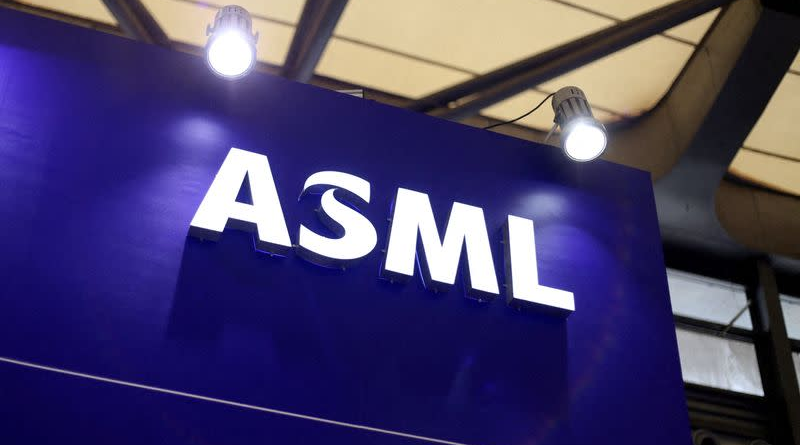Any Expansion of China Chip Curbs Will Risk Business, ASML Says – Asia Financial
The largest supplier of equipment to computer chip makers said new competitors with ‘substantial financial resources’ and ‘the ambition of self-sufficiency’ were a business risk
Europe’s most valuable technology company, ASML, has warned that the likelihood of any expansion of curbs targeting its exports to China remain business risks for the firm.
The Dutch firm noted the growing list of restrictions imposed by the United States, mostly with assent from the Dutch government, in its annual report published on Wednesday.
“Our ability to deliver technology in certain countries such as China has been and continues to be impacted by our ability to obtain required licenses and approvals,” the report said in a section on geopolitical risks.
“The list of Chinese entities impacted by export control restrictions has increased since 2022… The list of restricted customers and the scope of the restrictions are subject to change,” the company wrote.
ASML dominates the market for lithography systems, machines used to help create circuitry in one key step of the chipmaking process.
Following a US-led campaign to slow Beijing’s technological and military advances, ASML has been restricted from selling an array of advanced chipmaking tools to Chinese customers.
Up until last year, ASML was shipping several high-productivity DUV (Deep Ultraviolet) lithography machines to China, but the Dutch government revoked those licences before the start of 2024.
The changes impact “a small number of customers in China,” ASML noted.
The company — the largest supplier of equipment to computer chipmakers — has already been restricted from selling its most advanced chipmaking tools, the EUV (Extreme Ultraviolet) lithography machines to China since 2019. It has never sold an EUV tool there.
As part of the geopolitical risks facing the firm, ASML noted the probability of retaliatory bans affecting its business as well.
“The semiconductor industry makes use of (raw) materials that are controlled by certain countries. In the current geopolitical context, we see an increasing risk exposure that these materials may become unavailable or restricted,” ASML said in the annual report.
Last year, China imposed curbs on the export of two key chipmaking metals — gallium and germanium — starting August, in measures largely seen as retaliation to Washington’s chip war.
For months, China tightly clamped down on exports of both metals, until December, when its exports of both metals recovered sharply.
Even so, multiple Chinese officials have warned that Beijing could impose more retaliatory measures if the US continues to target China’s tech industry.
In 2023, while many chipmakers were slowing orders amid an industry slump, China passed South Korea to become ASML’s second largest market, representing 26.3% of sales, with Taiwan remaining its largest at 29.3%.
But the Chinese government is also throwing billions at domestic chipmaking, in a bid for self sufficiency. Chinese president Xi Jinping has, on multiple occasions, called on the tech industry to rev up innovation and reduce dependence on Western supply chains.
Companies such US-sanctioned Huawei and state-backed chipmaker Semiconductor Manufacturing International Corporation (SMIC) have been leading that push, but mostly in the field of chipmaking.
Shanghai Micro Electronics Equipment (SMEE) is China’s best known maker of lithography machines. In December last year, Hong Kong media HK01 reported SMEE had successfully developed China’s first 28 nanometre lithography machine.
While that remains far behind the most cutting edge chipmaking equipment technology — world leader TSMC is working on a process to produce 2nm chips by 2025 — SMEE’s breakthrough is still a potential risk for ASML.
“We also face competition from new competitors with substantial financial resources, as well as from competitors driven by the ambition of self-sufficiency in the geopolitical context,” ASML noted in its report.
A post shared by Asia Financial (@asiafinancial)
“Furthermore, we face competition from alternative technological solutions or semiconductor manufacturing processes.”
The Dutch firm also noted competition from Japanese chip tech giants Canon and Nikon. Both “have substantial financial resources and broad patent portfolios,” it said.
Canon is planning to launch a new chipmaking tool this year — one that works like a ‘stamp machine’ and is capable of slashing costs for chip firms. A Canon executive said the firm was hoping to capture some market in China and take advantage of the restrictions imposed by Washington.
Vishakha Saxena is the Multimedia and Social Media Editor at Asia Financial. She has worked as a digital journalist since 2013, and is an experienced writer and multimedia producer. As a trader and investor, she is keenly interested in new economy, emerging markets and the intersections of finance and society. You can write to her at [email protected]
Asia Financial is owned by Capital Link International Holdings Ltd, 902, Wilson House 19-27 Wyndham Street, Central, Hong Kong. www.capitallinkintl.com

